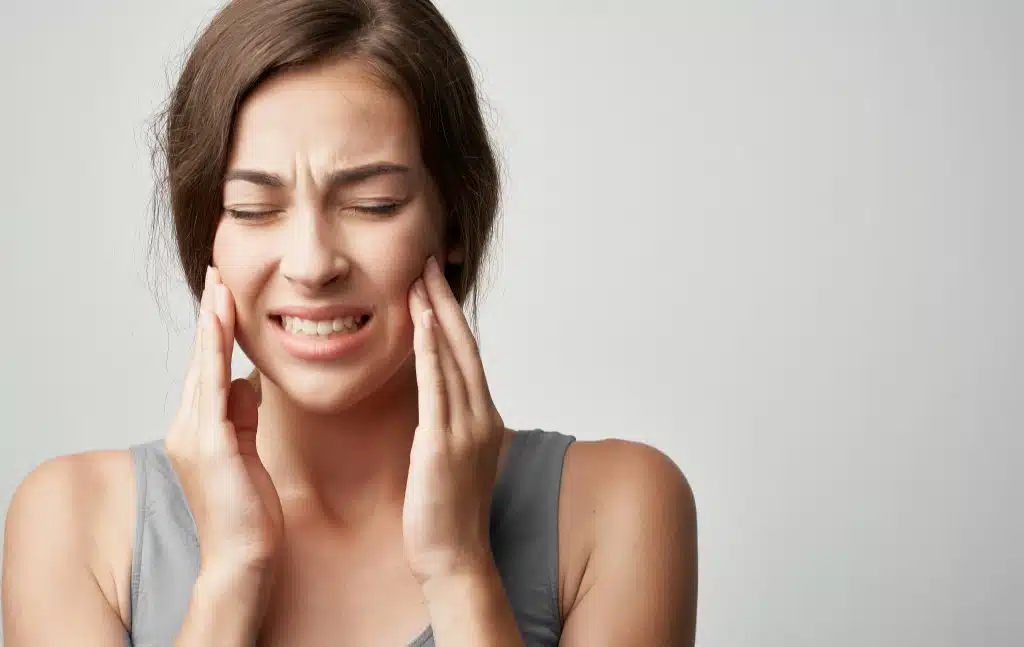Jaw pain is one of those annoyingly persistent conditions that can be hard to figure out, especially if the cause of your TMJ pain isn’t immediately obvious. While most types of jaw discomfort are harmless and go away on their own, some types of jaw pain can be more serious. Knowing what kind of condition you’re dealing with is vital to getting jaw pain treated effectively.
Here are just some of the most common causes of jaw pain and how you can treat them.
Bruxism (Teeth Clenching and Grinding)
Bruxism is a condition where you clench and grind your teeth. Sometimes it’s out of stress, while other times you do it while you’re sleeping. Bruxism makes your jaw sore because it puts pressure on the muscles in the jaw, not to mention joint overuse, which can lead to headaches and TMJ (temporomandibular joint disorder) problems.
Misaligned Teeth and Jaws
When your teeth don’t line up and your jaw doesn’t move normally, TMJ pain can be a painful side effect. This typically happens when the upper and lower jaws don’t meet together the way they’re supposed to. The bones in your face are supposed to line up in order to bite, chew, and break down your food for digestion. When they don’t, your TMJ has to go out of the way to move your jaw abnormally, just to chew up your food whenever you’re eating. Repeated day after day, irregular joint movements because of misaligned teeth are one of the most common causes of jaw pain and TMJ disorder.
Sleep Apnea
One of the most common causes of jaw pain is sleep apnea, as people with this sleeping disorder may grind their teeth at night, causing jaw pain and headaches. If you’re grinding your teeth, it’s important to speak with a dentist or doctor as soon as possible to determine if you have an undiagnosed sleep condition. It’s normal for people with obstructive sleep apnea to clench their teeth tightly together during episodes of oxygen deprivation, which can lead to broken, worn teeth in addition to jaw pain.
Stress
When we’re stressed, we tend to clench our teeth (leading to headaches and jaw pain). The constant pressure on the jaw can lead to muscle spasms, sharp muscle pains, or even migraine headaches. It’s important that you don’t just ignore these symptoms, as they may be warning signs for a more serious condition.
Medications
Certain medications such as stimulants or those used to manage attention needs can contribute to subconscious bruxism or teeth clenching and grinding. Jaw pain and headaches are a natural result when those issues come into play.
TMJ Disorder
When your jaw joint is damaged or deteriorating, TMJ disorder is to be expected. Symptoms include things like pain in the jaw joint when you’re eating or chewing, pain in the ear (often during yawning or eating), persistent headaches, and muscle spasms.
TMJ disorder can be caused by physical trauma like an accident or from grinding your teeth.
Jaw Pain Treatment
There are several treatments for jaw pain and TMJ disorder. One of the most common treatments is the use of a night guard, which is a custom-fitted mouthpiece that you wear at night while you sleep. The purpose of a night guard is to minimize pressure on your teeth and jaw, which can help reduce or prevent headaches and discomfort when you wake up in the morning.
Besides night guard or bruxism splints, other treatments for jaw pain might include:
- Orthodontic therapy
- Massage
- Anti-inflammatory medication
- Injectables (i.e., Botox)
- Warm compresses
- Cognitive behavioral therapy
- Sleep apnea appliances
- Physical therapy or jaw pain exercises
- Acupuncture
TMJ Treatment San Diego
SD Sleep Center offers jaw pain treatments in San Diego. TMJ (temporomandibular joint) disorders can lead to headaches, ringing in the ears, and facial pain, so it’s important to address your symptoms as soon as possible. SD Sleep Center offers a variety of services to treat your jaw pain at its source. For more information or to schedule an appointment contact SD Sleep Center today!


